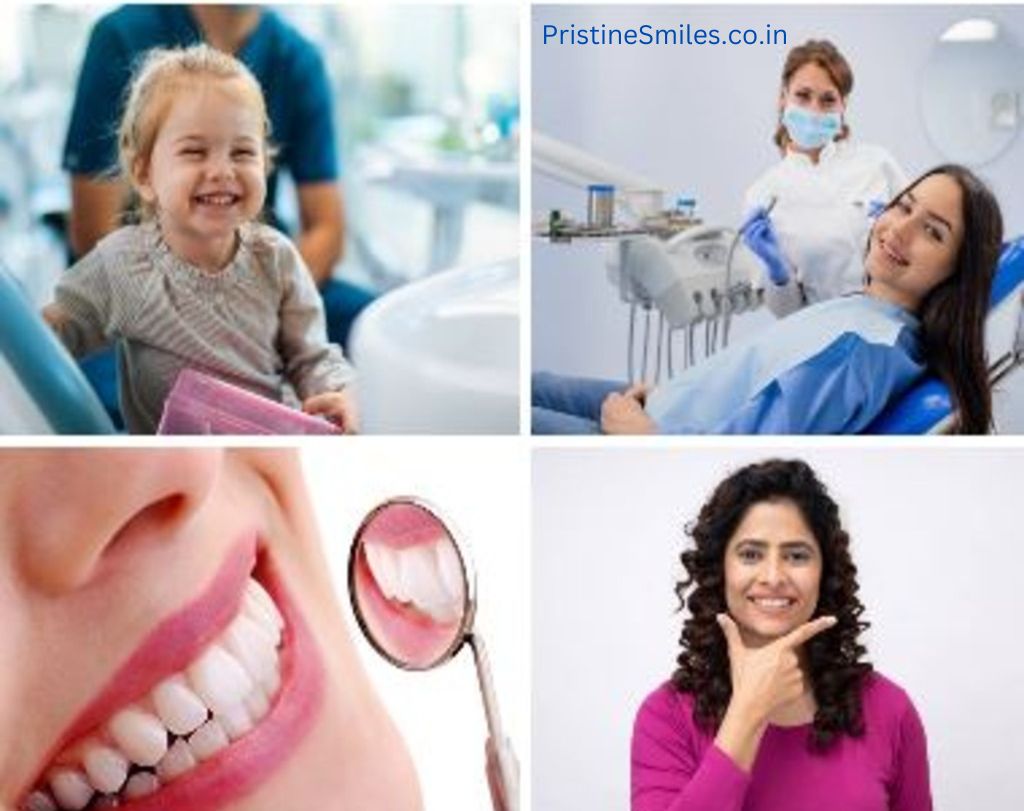Dental health is an essential aspect of our overall well-being, and it’s crucial to prioritize it across our lifespan. From childhood to old age, our teeth and gums go through various changes, and it’s vital to address these changes with proper care and prevention.
At Pristine Smiles Dental Care in Juhu, we understand the importance of maintaining good oral health throughout every stage of life. Our team of experts is dedicated to providing personalized care to patients of all ages, from children to seniors. In this blog, we’ll explore the unique dental health needs and challenges that arise at different stages of life and how we can help.

Childhood and Adolescence (0-18 years)
During childhood and adolescence, our teeth are developing, and it’s essential to lay the foundation for good oral health. Here are some key points to keep in mind:
- Early dental visits: Regular check-ups with a pediatric dentist starting from the eruption of the first tooth or by their first birthday.
- Preventive care: Cleanings, fluoride treatments, and sealants to prevent tooth decay and promote healthy teeth.
- Orthodontic evaluation: Assessing the need for braces or aligners to correct misaligned teeth and promote proper jaw growth.
- Education: Teaching children proper oral hygiene habits, such as brushing and flossing, and promoting a healthy diet.
Empirical Evidence
- A study published in the Journal of Dental Research found that children who visited the dentist regularly had a lower risk of tooth decay and other oral health issues.
- The American Academy of Pediatric Dentistry recommends regular cleanings and fluoride treatments for children to prevent tooth decay.
Adulthood (19-64 years)
During adulthood, our teeth and gums are more prone to damage, and regular care is crucial to prevent problems. Here are some key points to keep in mind:
- Regular cleanings and check-ups: Continue regular dental visits to prevent tartar buildup, gum disease, and tooth decay.
- Restorative care: Filling cavities, crowns, bridges, and implants to restore damaged teeth.
- Cosmetic procedures: Whitening, veneers, and other treatments to enhance the appearance of teeth.
- Oral cancer screening: Regular checks for signs of oral cancer, especially for those over 40.
Empirical Evidence
- A study published in the Journal of Dental Research found that regular cleanings and check-ups reduced the risk of gum disease and tooth loss.
- The American Dental Association recommends regular oral cancer screenings for adults over 40.
Seniorhood (65+ years)
In old age, our teeth and gums undergo significant changes, and it’s essential to address these changes with proper care. Here are some key points to keep in mind:
- Regular cleanings and check-ups: Continue regular dental visits to prevent tartar buildup, gum disease, and tooth decay.
- Restorative care: Dentures, implants, and other treatments to restore damaged teeth.
- Management of dry mouth and gum recession: Addressing these common issues with saliva substitutes and gum grafting.
- Oral cancer screening: Continuing regular checks for signs of oral cancer.
Empirical Evidence
A study published in the Journal of Gerontology found that regular dental care reduced the risk of tooth loss and improved overall health in seniors.
The American Dental Association recommends regular oral cancer screenings for seniors.
Conclusion
Dental health is a lifelong journey, and it’s crucial to prioritize it across our lifespan. By understanding the unique needs and challenges at each stage of life, we can take preventive dental care measures and seek proper care to maintain optimal oral health. Remember, regular dental visits and good oral hygiene habits are key to a healthy, happy smile for life.
At Pristine Smiles Dental Care, we’re committed to providing comprehensive and personalized dental care to patients of all ages. By understanding the unique needs and challenges at each stage of life, we can help you achieve optimal oral health and a beautiful, healthy smile. Contact us today to schedule your appointment!
FAQs
At what age should children start visiting the dentist?
Children should start visiting the dentist as soon as their first tooth erupts or by their first birthday, according to the American Academy of Pediatric Dentistry.
How often should children have dental check-ups?
Children should have dental check-ups every six months to monitor their oral health and prevent dental issues.
Is fluoride treatment safe for children?
Yes, fluoride treatment is safe for children and helps prevent tooth decay by strengthening the enamel.
When should adults have oral cancer screenings?
Adults should have oral cancer screenings as part of their regular dental check-ups, especially those over the age of 40.
Can braces be worn during adulthood?
Yes, braces can be worn during adulthood to correct misaligned teeth and improve dental health and aesthetics.
What are the common dental issues faced by seniors?
Common dental issues faced by seniors include gum disease, tooth decay, dry mouth, and oral cancer.
How often should seniors have dental check-ups?
Seniors should have dental check-ups every six months to monitor their oral health and address any issues promptly.
Are dental implants suitable for seniors?
Yes, dental implants are suitable for seniors and can be used to replace missing teeth and restore oral function.
How can seniors maintain good oral health at home?
Seniors can maintain good oral health by brushing and flossing daily, using fluoride toothpaste, and avoiding tobacco products.
What should seniors do if they experience dental pain or discomfort?
Seniors should consult a dentist if they experience dental pain or discomfort to address any underlying issues and prevent further complications.
